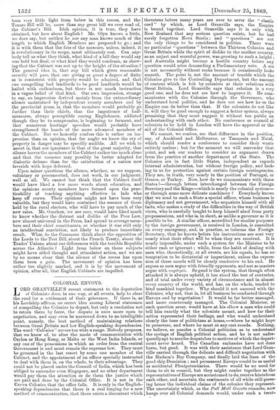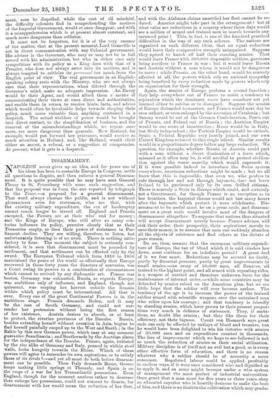COLONIAL ENVOYS.
LORD GRANVTTJ,F'S recent statement to the deputation of Colonists does, in one way, at all events, help to clear the road for a settlement of their grievance. If there is, as his Lordship affirms, no secret idea among Liberal statesmen of compelling the Colonies to depart, but only a resolution not to retain them by force, the dispute is once more open to negotiation, and may even be narrowed down to an intelligible point, namely, the best method of maintaining relations between Great Britain and her English-speaking dependencies. The word "Colonies" covers too wide a range." Nobody proposes, that we know of, to alter the mode of communication with Ceylon or Hong Kong, or Malta or the West India Islands, or any one of the possessions in which an order from the central Government is and must remain the supreme law. They must be governed in the last resort by some one member of the Cabinet, and the appointment of an officer specially instructed to deal with them is, on the whole, to their advantage. They could not be placed under the Council of India, which has been obliged to surrender even Singapore, and no other department would pay them the attention or do them the justice which are paid and done by the Colonial Office. It is not in the Crown Colonies that the office fails. It is only in the English- speaking dependencies that there is a real longing for a new method of communication, that there exists a discontent which threatens before many years are over to sever the " elastie cord " by which, as Lord Granville says, the Empire is bound together. Lord Granville says it is only with New Zealand that any serious question exists, but he had surely forgotten Nova Scotia ; and " questions " are not the only things to be considered in politics. There were no particular " questions " between the Thirteen Colonies and Great Britain while the spirit of dislike to the mother country, as an unjust and scornful power, was growing to such a height ; and Australia might become a hostile country before any question would arise demanding a Parliamentary vote. A sea is not necessarily without rocks because it occasionally looks. smooth. The point is, not the amount of trouble which the Colonies give to the Controlling Department, but the amount of content which is felt by colonists at their relations with Great Britain. Lord Granville says that relation is a very good one, and he does not see how to improve it. He com- municates with the Colonies through the Governors, who- understand local politics, and he does not see how he or the- Empire can do better than that. If the colonists do not like it, will they be good enough to suggest a better system, always premising that they must suggest it without too public an understanding with each other. No conference or council of colonists to be held in London will have the approval or the aid of the Colonial Office.
We cannot, we confess, see that difference in the position, say, of Auckland and Melbourne, or Tasmania and Natal, which should render a conference to consider their wants entirely useless ; but for the moment we will surrender that point, and ask our readers to consider an argument drawn from the practice of another department of the State. The Colonies are in fact little States, independent as regards internal administration, but without foreign policy, and look- ing to us for protection against certain foreign contingencies. . They are, in truth, very nearly in the position of Portugal, or Greece, or Turkey. Now, how do we communicate with those States ?—through letters interchanged between the Foreign. Secretary and the Kings—which is nearly the colonial system or through some more delicate machinery ? Everybody knows, that we send to such a State a special officer, whose business is diplomacy and not government, who acquaints himself with all facts, who makes a study of the difficulties in the way of British views, who is carefully taught to keep himself aloof from party prepossessions, and who is, in short, as unlike a governor as it is possible to be. A similar officer, accredited for similar purposes by the foreign government, is received in London, is consulted on every emergency,, and, in practice, so informs the Foreign Secretary, that he knows before his instructions are sent very nearly what their effect will be when they are received. It is- nearly impossible, under such a system for the Minister to be either rash or ignorant ; while, from the habit of dealing with men who, theoretically, at all events, are his equals,. he has no temptation to be dictatorial or impertinent, unless the expres- sion of those moods will be clearly conducive to his end. He argues as men argue with friendly opponents, and not as masters- argue with employe's. So good is the system, that though often attacked it is always upheld, it has stood the teat of centuries, and of trial under every variety of circumstance and in almost every country of the world, and has, on the whole, tended to- bind mankind together. Why should it not succeed with the Colonies, why not, that is, let all business be conducted through Envoys and by negotiation ? It would- be far better managed, and more courteously managed. The Colonial Minister, as each question arose, would have at his elbow a man who could tell him exactly what the colonists meant, and how far their action represented their feelings, and who would understand clearly the tone of politicians at home,—where he might hope to persevere, and where he must at any cost recede. Nothing, we believe, so puzzles a Colonial politician as to understand the springs of English political action, and he is not unfre- quently apt to ascribe despatches to motives of which the depart- ment never heard. The Canadian embassies have not done harm, but good. It was with their assistance that Lord Gran- ville carried through the delicate and difficult negotiation with the Hudson's Bay Company, and finally laid the lines of the ship Dominion ; and permanent Envoys would be as useful as accidental Plenipotentiaries. There would be no need for them to sit in council, but they might confer together as the- representativesof Europe are accustomed to do, receive hintsfrom each other, and ascertain the sentiments of all while still press- ing home the individual claims of the colonies they represent.. The uncertainty which, as the Pall Mall Gazette remarks, now hangs over all Colonial demands would, under such a treat- -
went, soon be dispelled, while the root of all mischief, the difficulty colonists find in comprehending the motives of the Imperial Government, would at once disappear, and with it a misapprehension which is at present almost constant, and much more dangerous than collision.
It must not be forgotten, for it is of the very essence of the matter, that at the present moment Lord Granville is not in direct communication with any Colonial government. His adviser is the Governor, who may or may not be in full accord with his administration, but who in either case only sympathizes with its policy as a King does with that of a Premier, who does not always enter into its motives, and is always tempted to criticize its personnel too much from the English point of view. The real government in an English- speaking colony rests with the Ministry, who are not always sure that their representations, when filtered through the Governor's mind, make an adequate impression. An Envoy would be their Agent, and would afford them a means of communicating their views at once direct and authoritative, and enable them in return to receive hints, facts, and advice which would often be invaluable helps towards shaping their policy, much more valuable than anything contained in a despatch. The actual wielders of power would be brought into direct contact, to the simplification of business, and the removal of the misunderstandings which, we repeat once more, are more dangerous than quarrels. New Zealand, for example, would put forward her grievance, would receive as much attention as Holland, and, like Holland, would elicit either an assent, a refusal, or a suggestion of compromise. At present, what it gets is a despatch.



































 Previous page
Previous page